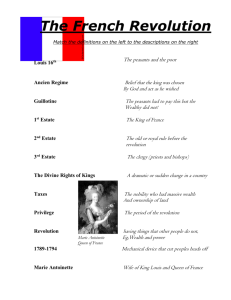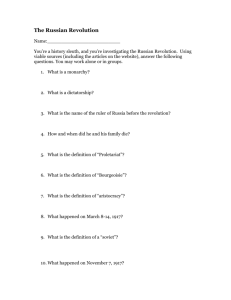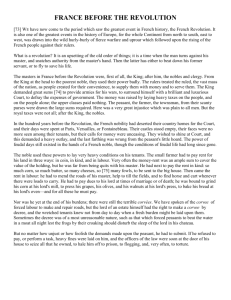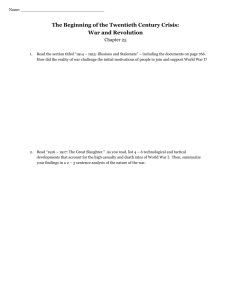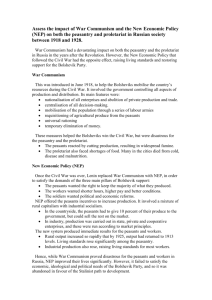Document has been edited for class use – MAK & Milne Nikolai
advertisement
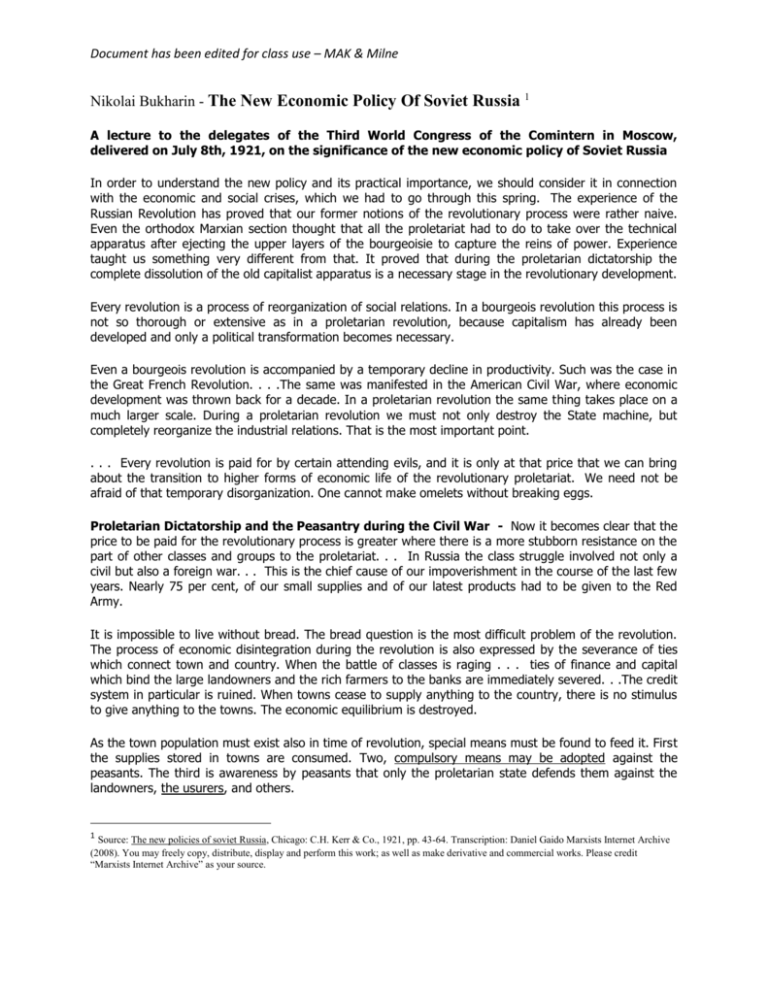
Document has been edited for class use – MAK & Milne Nikolai Bukharin - The New Economic Policy Of Soviet Russia 1 A lecture to the delegates of the Third World Congress of the Comintern in Moscow, delivered on July 8th, 1921, on the significance of the new economic policy of Soviet Russia In order to understand the new policy and its practical importance, we should consider it in connection with the economic and social crises, which we had to go through this spring. The experience of the Russian Revolution has proved that our former notions of the revolutionary process were rather naive. Even the orthodox Marxian section thought that all the proletariat had to do to take over the technical apparatus after ejecting the upper layers of the bourgeoisie to capture the reins of power. Experience taught us something very different from that. It proved that during the proletarian dictatorship the complete dissolution of the old capitalist apparatus is a necessary stage in the revolutionary development. Every revolution is a process of reorganization of social relations. In a bourgeois revolution this process is not so thorough or extensive as in a proletarian revolution, because capitalism has already been developed and only a political transformation becomes necessary. Even a bourgeois revolution is accompanied by a temporary decline in productivity. Such was the case in the Great French Revolution. . . .The same was manifested in the American Civil War, where economic development was thrown back for a decade. In a proletarian revolution the same thing takes place on a much larger scale. During a proletarian revolution we must not only destroy the State machine, but completely reorganize the industrial relations. That is the most important point. . . . Every revolution is paid for by certain attending evils, and it is only at that price that we can bring about the transition to higher forms of economic life of the revolutionary proletariat. We need not be afraid of that temporary disorganization. One cannot make omelets without breaking eggs. Proletarian Dictatorship and the Peasantry during the Civil War - Now it becomes clear that the price to be paid for the revolutionary process is greater where there is a more stubborn resistance on the part of other classes and groups to the proletariat. . . In Russia the class struggle involved not only a civil but also a foreign war. . . This is the chief cause of our impoverishment in the course of the last few years. Nearly 75 per cent, of our small supplies and of our latest products had to be given to the Red Army. It is impossible to live without bread. The bread question is the most difficult problem of the revolution. The process of economic disintegration during the revolution is also expressed by the severance of ties which connect town and country. When the battle of classes is raging . . . ties of finance and capital which bind the large landowners and the rich farmers to the banks are immediately severed. . .The credit system in particular is ruined. When towns cease to supply anything to the country, there is no stimulus to give anything to the towns. The economic equilibrium is destroyed. As the town population must exist also in time of revolution, special means must be found to feed it. First the supplies stored in towns are consumed. Two, compulsory means may be adopted against the peasants. The third is awareness by peasants that only the proletarian state defends them against the landowners, the usurers, and others. 1 Source: The new policies of soviet Russia, Chicago: C.H. Kerr & Co., 1921, pp. 43-64. Transcription: Daniel Gaido Marxists Internet Archive (2008). You may freely copy, distribute, display and perform this work; as well as make derivative and commercial works. Please credit “Marxists Internet Archive” as your source. Document has been edited for class use – MAK & Milne As regards the arguments of the opportunists that the peasantry was opposed to the Bolsheviks and rule by sheer force, every Marxist will say that this is nonsense. Not even the Czar’s government was capable of performing such a feat. . . . Of course, every war has its laws. The experience of capitalist countries has shown that the economic changes can more easily be effected in war than in peace time. . .Due to this we were able to estimate our resources and regulate economy by strongly applying the dictatorship of the proletariat. But after war was over the contradictions in this economic system came to the surface at once, first and foremost the contradictions between the regulating tendencies and the anarchical tendencies of the peasantry. Inflexibility of the Peasant and De-classing of the Proletariat - It was proved economically that if we take away all the surplus of the peasants’ produce we take away almost all the incentive to further production. If the peasant knows that he will be deprived of all surplus produce he will only produce for himself and nothing for others. [After the war]. . . . Agriculture was in a critical condition, and we were in danger of being left without sufficient bread. It is not true that our technical apparatus is totally disorganized. In many important branches of the textile and metal industries, as well as others, we possess a good technical apparatus. But the great problem facing us is how to provide the towns with the necessaries of life. In our country the workers are hungry because the exchange of goods between town and country is paralyzed. These economic conditions have their social consequences. When large industry is in such a miserable condition the workers seek to find a way, e. g., by manufacturing small articles of every day use at the places where they work, which they subsequently sell.. . When in this way the worker becomes interested in free trade, he begins to regard himself as a small producer, a petty bourgeois.. . . . Such is the social crisis within the working class. As soon as the war was over the peasants immediately presented their demands. They are interested in small trade. They are supporters of free trade, and opposed to the compulsory socialist system of economy. These demands were presented in the form of peasant risings in various districts in Siberia, Tambov, etc. At the time of the October Revolution and previous to it we were the party that told the peasant to kill the landowner and to take his land. The Bolsheviks were then thought to be capital fellows. They gave the peasants everything and demanded nothing in return. But in the end we became the Party which gave nothing and demanded everything from the peasants. They were consequently against the communists, who were taking away their bread and moreover preached absurd ideas of communism, unsuitable to the peasants. The proletariat . . . shared the same views. In some places even metal workers took up the watchwords: “Free trade,” against the “Communist,” for class dictatorship but against Party dictatorship. Thus the equilibrium between the proletariat and the peasantry was destroyed. A misunderstanding arose which threatened the whole system of the proletarian dictatorship. The crisis found its expression in the Kronstadt mutiny. The documents which have since been brought to light show clearly that the affair was instigated by purely white guard centers, but at the same time the Kronstadt mutiny was a petty bourgeois rebellion against the socialist system of economic compulsion. Sailors are mostly sons of peasants, especially Ukrainian peasants. Ukraine is more petty bourgeois than Central Russia. The peasants there resemble more the German farmers than the Russian peasants. They are against Czarism but have little sympathy for communism. The sailors were home on leave and there became strongly infected with peasant ideas. This was the cause of the revolt.
